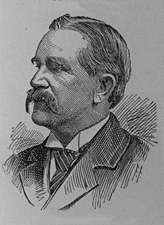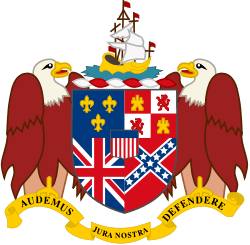Joseph F. Johnston
| Joseph F. Johnston | |
|---|---|
 | |
| United States Senator from Alabama | |
|
In office August 6, 1907 – August 8, 1913 | |
| Preceded by | Edmund Pettus |
| Succeeded by | Francis S. White |
| 30th Governor of Alabama | |
|
In office December 1, 1896 – December 1, 1900 | |
| Preceded by | William C. Oates |
| Succeeded by | William J. Samford |
| Personal details | |
| Born |
March 23, 1843 Lincoln County, North Carolina |
| Died |
August 8, 1913 (aged 70) Washington, D.C. |
| Political party | Democratic |
| Spouse(s) | Theresa Virginia Hooper |
| Children |
William Hooper Johnston Edward Douglas Johnston Forney Johnston |
| Military service | |
| Allegiance |
|
| Service/branch |
|
| Rank |
|
| Battles/wars | American Civil War |
Joseph Forney Johnston (March 23, 1843 – August 8, 1913) was an American Democratic politician and businessman who was the 30th Governor of Alabama from 1896 to 1900. He later served in the U.S. Senate from August 6, 1907 to his death on August 8, 1913. During his time as a senator, he served as a chairman of the Committee to Establish a University of the United States.
Biography
Born in Lincoln County, North Carolina, on March 23, 1843, Johnston attended the rural public schools in North Carolina during his youth. Johnston moved to Talladega, Alabama at the age of seventeen, and attended a military academy. At the outbreak of the Civil War, Johnston enlisted as a private in the Confederate States Army. Johnston served through the duration of the war, receiving wounds at Chickamauga, Spotsylvania, New Market, and Petersburg. By war's end, he attained the rank of captain.
After returning from the war, Johnston studied law under William H. Forney and was admitted to the bar. He practiced law in Selma, Alabama, eventually moving to Birmingham to become president of the Alabama National Bank. In 1887, Johnston became president of the Sloss Iron & Steel company, an industry thriving in Alabama at the time.
Johnston first entered the political arena in 1890, when he ran for Alabama Governor, but lost to Thomas G. Jones. In 1896, he again ran for Governor and succeeded, serving two consecutive two-year terms as Governor of Alabama. Johnston's achievements during his tenure as governor include tax reform, creation of the Alabama Department of Insurance, and the establishment of a State Mine Inspector.
Johnston decided not to seek another term as Governor in 1900, and instead challenged John Tyler Morgan in that year's Senate election. Morgan defeated Johnston, and in 1902, Johnston sought a third term as Governor against incumbent William D. Jelks. The revelation of several scandals involving Sloss Iron & Steel, as well as misconduct in the prison system hurt Johnston and he would ultimately lose the election.
Johnston did attain political office again, however, by being elected to complete Senator Edmund Pettus's term after Pettus had died in office in 1907. Johnston was re-elected in 1909, and served in the Senate until his death from pneumonia in 1913.
Johnston was married to Theresa Virginia Hooper of South Carolina. They had three sons: William Hooper, Edward Douglas, and Forney. He is buried in Birmingham's Elmwood Cemetery.
External links
- United States Congress. "Joseph F. Johnston (id: J000193)". Biographical Directory of the United States Congress.
- Joseph F. Johnston at the Alabama Department of Archives & History
- Joseph F. Johnston at Find-A-Grave
| Political offices | ||
|---|---|---|
| Preceded by William C. Oates |
Governor of Alabama 1896–1900 |
Succeeded by William J. Samford |
| United States Senate | ||
| Preceded by Edmund Pettus |
U.S. Senator from Alabama 1907–1913 |
Succeeded by Francis S. White |

